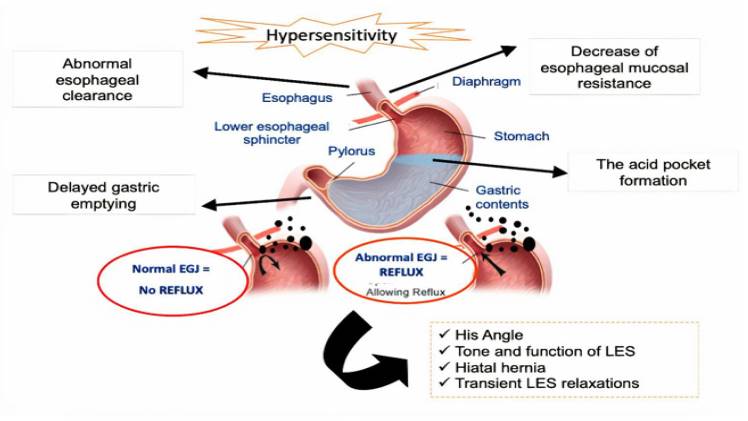
Nighttime GERD symptoms can turn what should be a peaceful night’s rest into a restless ordeal. But fear not! There are several non-invasive solutions that have proven effective for many GERD sufferers. Today, I’m excited to share my top 5 picks with you.
What is GERD? A Quick Overview
Before we dive into the solutions, let’s quickly touch base on what GERD is. GERD, or Gastroesophageal Reflux Disease, is a chronic condition where stomach acid frequently flows back into the tube connecting your mouth and stomach (esophagus). This backwash (acid reflux) can irritate the lining of your esophagus, leading to discomfort and other complications.
Why Nighttime GERD is a Unique Challenge
GERD, while troublesome during the day, can become a real menace at night. But why is that? Why do so many of us GERD warriors find ourselves clutching our chests in the wee hours? Let’s dive deep and understand the nocturnal nuances of this condition.
1. Gravity: The Silent Player
When we’re upright, good old gravity helps keep stomach contents, including the acid, down. But the moment we lie down, this natural barrier is gone. Without the force of gravity pulling everything downwards, it becomes much easier for stomach acid to creep up into the esophagus.
This is why elevating the head while sleeping, and using tools like a bed wedge for GERD, can be a game-changer. It reintroduces gravity to the equation, helping to keep that pesky acid at bay.
2. Swallowing: Less is Not More
During our waking hours, we swallow quite frequently, even if we don’t realize it. Every time we swallow, we’re pushing acid back into the stomach. But when we’re asleep, the frequency of swallowing decreases significantly. This means that if acid does make its way up, there’s less natural action pushing it back down.
Did you know the average person swallows about 600 times a day? That’s roughly once every 1.5 minutes!
Extended Exposure: The Lingering Guest
Imagine a guest who overstays their welcome. That’s what stomach acid does during the night. If it enters the esophagus while you’re asleep, it doesn’t just visit; it settles in. This prolonged exposure can lead to more irritation and damage than a quick splash during the day.
Comparison Table: Day vs. Night GERD
| Aspect | Daytime GERD | Nighttime GERD |
| Gravity’s Role | Active (due to being upright) | Reduced (due to lying down) |
| Swallowing Frequency | High | Low |
| Acid Exposure Duration | Shorter | Longer |
Nighttime GERD is not just regular GERD in the dark. It’s a unique beast with its own set of challenges. But understanding these challenges is the first step in managing them. With the right strategies and tools, we can all look forward to more restful nights. Sleep tight, and don’t let the GERD bite!
Top 5 Non-Invasive Solutions for Nighttime GERD Relief
1. Elevate Your Upper Body
One of the most effective ways to combat nighttime GERD is by elevating your upper body. Using a bed wedge for GERD can help keep stomach acid where it belongs – in your stomach.
Reflux Guard offers a range of bed wedges for GERD sufferers. These wedges are designed to provide the optimal elevation and support for a comfortable night’s sleep.
Bed Wedges vs. Adjustable Beds
| Feature | Bed Wedges | Adjustable Beds |
| Cost | $ | $$$ |
| Portability | High | Low |
| Flexibility | Fixed angle | Multiple angles |
| Maintenance | Low | Moderate |
2. Watch Your Diet
Avoiding certain foods and drinks can significantly reduce GERD symptoms. Common triggers include:
- Spicy foods
- Citrus fruits
- Tomato-based products
- Chocolate
- Caffeinated drinks
- Alcohol
Keep a food diary for a week. Note down everything you eat and drink, and when you experience GERD symptoms. This can help you pinpoint specific triggers.
3. Maintain a Healthy Weight
Carrying extra weight, especially around your abdomen, can put more pressure on your stomach, leading to acid reflux. Consider adopting a balanced diet and regular exercise regimen to shed those extra pounds.
4. Sleep on Your Left Side
Sleeping on your left side can reduce the chance of acid entering the esophagus. This position naturally keeps your stomach below the esophagus, making acid reflux less likely.
Why it Works: When you sleep on your left side, the stomach and its gastric juices stay lower than the esophagus. In contrast, sleeping on your right side can put the stomach in a position higher than the esophagus, making reflux more likely.
5. Over-the-Counter Medications
While I always recommend trying natural solutions first, there are several OTC medications that can provide relief:
- Antacids: Neutralize stomach acid. Great for immediate relief but not for long-term use.
- H2 blockers: Reduce acid production. They work for a longer duration than antacids but might take an hour or so to kick in.
- Proton pump inhibitors (PPIs): Block acid production and heal the esophagus. They’re more potent and are often used for severe GERD symptoms.
Always consult with a healthcare professional before starting any medication. They can guide you on the right dosage and duration.
With these solutions in hand, you’re well-equipped to tackle nighttime GERD head-on. Remember, everyone’s body is different, so it might take some experimentation to find the perfect solution for you. Stay persistent, and here’s to peaceful nights ahead!
Final Thoughts
Nighttime GERD doesn’t have to rob you of a good night’s sleep. With the right strategies in place, you can reduce or even eliminate those pesky symptoms. Remember, everyone is different, so it might take some trial and error to find what works best for you. Stay persistent, and sweet dreams!
About the Company
Reflux Guard is a leading provider of bed wedges designed specifically for GERD sufferers. Their products are crafted with the user’s comfort and health in mind, ensuring a restful night’s sleep free from the discomfort of acid reflux. For more information on their range of bed wedges and other GERD solutions, visit their website.



